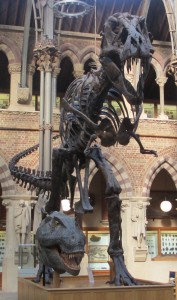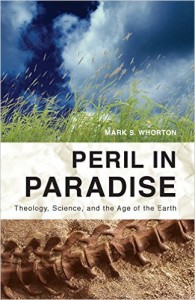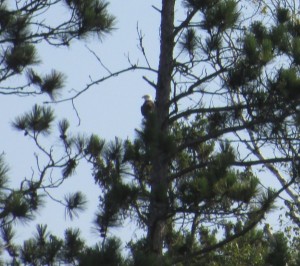It is not uncommon for those who hold to a specific view of young earth creationism to claim that rejection of this view is rejection of the gospel itself. In particular, the acceptance of animal death before Adam sinned makes a mockery of the Christian story. James Stambaugh’s article Death Before Sin is one such example. He makes no bones about it. “Those who accept the Bible believe that death is a punishment for sin; death must have come into existence after Adam fell.” This is integral to the atonement. From the same article:
So a blood sacrifice is only necessary if there is sin. … If there was animal death before the fall of man, then God and all those who followed His pattern did useless acts. One must observe that in the atonement the animal loses its life in the place of the human. If animal death existed before the fall, then the object lesson represented by the atoning sacrifice is in reality a cruel joke.
The New Testament has one sacrifice for atonement, for Jesus Christ is called the “Lamb of God.” If we believe that death has always existed, then we make a mockery of the death of Christ. This is exactly what evolution means. … If death is not the penalty for sin, then Christianity is meaningless. The death of Christ was made necessary because of man’s sin. Man’s sin brought death, which in turn brought God’s Son to pay the penalty in our place.
This article is from the Institute for Creation Research. Similar arguments are presented by other vocal defenders of young earth creationism including Answers in Genesis. I have had such arguments directed toward me on this blog from time to time. In the next few chapters of his book Peril in Paradise Mark S. Whorton addresses the issue of animal death in an old earth view of creation. Whether one accepts evolution as the mechanism for creation of the diversity of life or not (and Whorton does not) the issue remains an active one.
Whorton lists four primary claims against animal death before the sin of Adam (p. 156).
Claim 1: The penalty for the curse included animal death in a fallen creation.
Claim 2: The doctrine of atonement depends on original animal immortality.
Claim 3: Animal death and suffering could not be considered “vary good” by a loving, wise, and merciful Creator.
Claim 4: All animals were created as herbivores and commanded to be vegetarians.
The first claim must be read back into Genesis. There is no intrinsic indication that all animal death is the result of the sin of Adam and Eve. Whorton discusses the curses in particular, on the snake, Eve, and Adam. The punishment for the serpent is to be humiliated by being relegated to slithering on the ground with enmity between humans and snakes. There is nothing here that indicates the introduction of death for ordinary snakes in particular, animals in general. If one takes the serpent as Satan as in later Jewish and Christian thought, then the curse is “a foreshadowing of the humiliation and eventual demise of Satan.” (p. 159) saying nothing about animals in general. The curse on the woman is an increase of pain in childbirth and strife between husbands and wives.The curse on the man (or on the ground because of the man) is an increase in the toil required to live in the land. Whorton summarizes “The curse serves to illustrate the distinction between man and animal in the garden. The promise of life and the curse of death was set before man in the center of the garden. … There was no promise of life or curse of death for the animals in the center of the garden. Blessing and curse were there only for the ones created in the image of the maker.” (p. 163)
The book of nature. Scripture does not positively ascribe immortality to animals before the fall, but it also does not speak directly to the issue. In contrast, the “book of nature,” God’s self revelation in his creation, provides ample evidence for animal death long before any humans were on the scene. This revelation needs to be taken seriously because it is from God. Scripture attests to the power of nature to declare the glory of God such that all are without excuse. As one example Psalm 19 extols both the revelation of God in the heavens and in his law. “The heavens declare the glory of God, and the sky above proclaims his handiwork. … The law of the Lord is perfect, reviving the soul; the testimony of the Lord is sure, making wise the simple.” Romans 1:19-20 is another example. Whorton argues that we can’t rank the revelation of God in Scripture and in nature. Both must be reliable witnesses for the same reason.
To rank the revelations of God is to compromise the very character of God. Nature must be an inerrant revelation because otherwise God would be unjust to hold people accountable on the basis of a flawed or deceptive revelation. … Consistency of truth across all domains of revelation is demanded by a commitment to biblical inerrancy. (p. 171)
The so-called propositional nature of Scripture vs presuppositional interpretation of nature isn’t a valid reason for privileging Scripture over nature. Both Scripture and nature must be interpreted. “Presuppositions weigh heavily on biblical interpretation as well. Many false doctrines have arisen because proof texts were interpreted in terms of a flawed paradigm.”(p. 172) The correct distinction is not between Scripture and nature but between humans – theologians and scientists. Scripture, like nature, must be interpreted and interpretations can be flawed. There is no reason to trust every pronouncement from scientists, especially those that are more metaphysical than scientific, but the church should be willing to listen to Christian scientists who understand the science and can help integrate it with Christian theology.
This in no way diminishes the authority of Scripture; it simply integrates the whole of God’s revelation. Truth is not in jeopardy when theologians and scientists differ. Wisdom would have us discern which interpretation is most solidly established in the revelation of God in Scripture and in nature. (p. 173)
The second claim rests primarily on Romans 5 and 1 Corinthians 15. But Romans 5:12 talks about death spreading to all people because all sinned; it does not have anything to say about animal death. In 1 Cor. 15:21-22 Paul contrasts death through Adam to life through Christ. “For as in Adam all die, so in Christ all will be made alive.”
If the “all” that die in Adam includes animals, then the “all” made alive by Christ must also include animals. Certainly this is not the intent of the text since no mention in made in Scriptures to the spiritual nature of animals, the moral capacity of animals, the need for animal redemption, not the physical or spiritual resurrection of animals. (p. 186)
The quote from James Stambaugh at the top of this post (and a similar statement by Ken Ham quoted by Whorton) connects all animal death to blood atonement. But this is also in error. Whorton argues that the blood sacrifice of animals in the Old Testament was “a type of Christ.” He looks to Hebrews 10 for support, and particularly verse 4: For it is impossible for the blood of bulls and goats to take away sins.
Rather than actually bringing the remission of sins, the sacrificial death of particular animals in special circumstances served as a type of Christ. Those sacrifices did not satisfy the Father; they only served as a type of the satisfying payment that was to come. Only the blood of Christ brought ultimate satisfaction to God and redemption to man. (p. 187)
and more succinctly.
The atoning death of Christ is not affected by the death of animals prior to the fall of Adam. The death of animals prior to man’s sin does not alter the consequences of sin nor render the atonement meaningless. … God used the sacrificial death of animals as a picture to illustrate the Redeemer, the only Lamb of God who would take away the sin of the world. This, not animal death, is the basis of the gospel. (p. 189)
Claim three rests on a flawed interpretation of “very good.” God declares something good when it serves the purpose for which it was designed. There are many instances in Scripture where God uses imperfect persons or things for his purposes. The same phrase used for “very good” in Genesis 1 is used to describe Rebekah in Genesis 24:16 and the Promised land in Numbers 14:7. Neither Rebekah nor the promised land were perfect. That animal death is a normal part of earthly existence can be deduced through a number of passages of Scripture. The psalmist in 104 writes that “The lions roar for their prey and seek their food from God. … All creatures look to you to give them their food at the proper time.” Job 38 is similar. Both lions and eagles are provided for. God provides prey for the predator and this is good.
Certainly God would not command animals to behave in a way that is contrary to His nature and point to it as an example of His glory. The clear implication is that the natural order of predator and prey is part of the eternal plan of God and not a result of the curse. The Bible demonstrates the truth that animal predation is part of God’s provision for creation. (p. 202)
Claim four – with its vegetarian lions and tigers and eagles – falls with the examples given above. Here, however, Whorton notes that Genesis can be read to indicate that humans were vegetarian until after the flood. Initially they are given the fruits of the earth as food, but after the flood Noah is told “Everything that lives and moves about will be food for you. Just as I gave you the green plants, I now give you everything.(9:3)” Human life is sacred. An accounting is demanded for the shedding of human blood, whether by man or beast, but animal life is not held to the same standard. Nothing in these passages requires that all animals were also vegetarian until given permission to eat meat. Nature provides ample evidence that many animals have always been carnivores. Whorton dealt with this evidence in an earlier chapter, Fitness and the Fall. There is no biblical support for a sudden change in animals following the fall or the flood and many animals of today could not thrive or even survive as vegetarians.
Animal death before the fall is no threat to Christian faith or hope.
How would you counter the argument that all death must be a consequence of the Fall?
What role does animal death play in atonement?
If you wish to contact me directly you may do so at rjs4mail[at]att.net.
If interested you can subscribe to a full text feed of my posts at Musings on Science and Theology.








